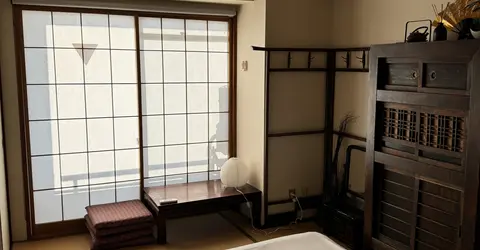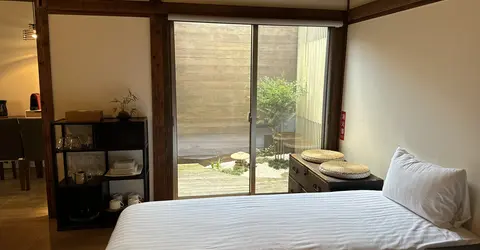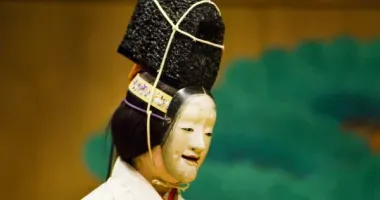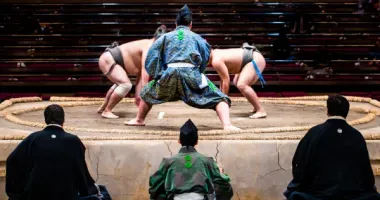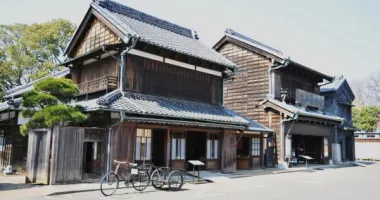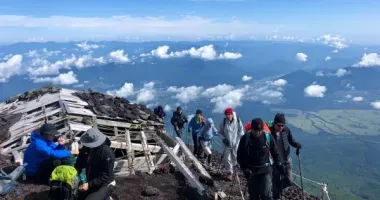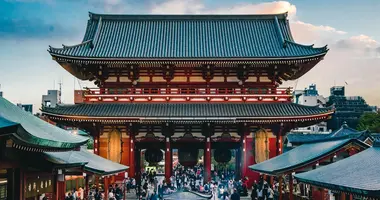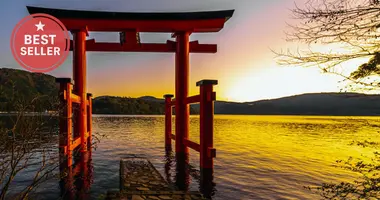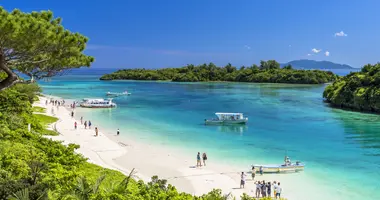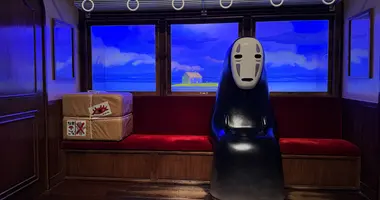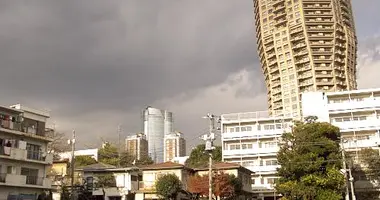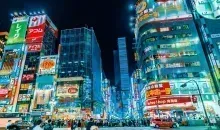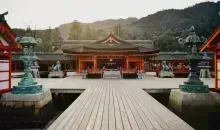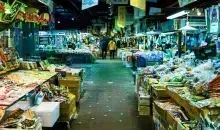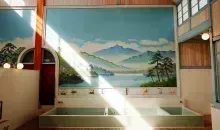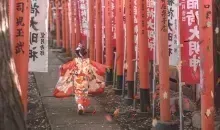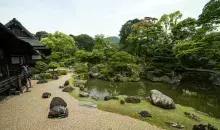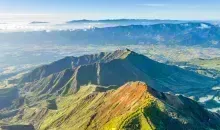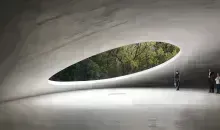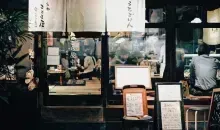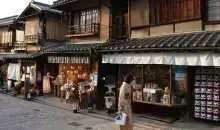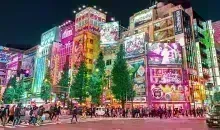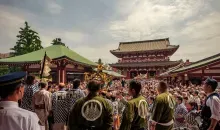Onjuku: A charming coastal town in Chiba Prefecture
- Published on : 13/06/2024
- by : Japan Experience
- Youtube

Tsuki no Sabaku ("Moon Desert") camel statues on Onjuku beach
Nestled on the eastern coast of Chiba prefecture, Onjuku is a delightful seaside town that offers a perfect escape from the bustle of Tokyo. With its pristine white sand beach, renowned surfing spots, and rich historical heritage, Onjuku attracts visitors seeking both relaxation and adventure. Just 90 minutes from Tokyo by train, this charming town provides a unique blend of traditional Japanese culture and modern beach resort amenities. Whether you're a surf enthusiast, history buff, or simply looking for a peaceful getaway, Onjuku's warm hospitality and stunning coastal scenery make it an ideal destination for all seasons.
Introduction to Onjuku: Location, geography, and history
Onjuku (御宿町, Onjuku-machi) is situated on the east coast of southern Chiba Prefecture, approximately in the center of the outer coast of the Bōsō Peninsula. The town faces Ajiro Bay, which boasts two functional ports: the Port of Iwawada to the north and the Port of Onjuku to the south. With a total area of 24.86 square kilometers, Onjuku is characterized by rolling, sandy hills of the Bōsō Hill Range.
The town's history dates back to ancient times when it was part of Kazusa Province. During the Edo period, Onjuku was divided into various administrative areas, with much of the town being tenryō territory ruled by hatamoto on behalf of the Shogun. The name "Onjuku" itself has an interesting origin, derived from a poem written by Tokiyori Hojo (1227-1263), the fifth regent of the Kamakura shogunate, who mentioned the "honorable lodgings" he enjoyed while staying at the local Saimyoji Temple.
Onjuku's climate is classified as humid subtropical, characterized by warm summers and cool winters with light to no snowfall. The average annual temperature is 15.1°C, with August being the warmest month (around 25.5°C) and January the coolest (around 5.8°C). This mild year-round climate contributes to Onjuku's popularity as a beach resort town.
Onjuku's beautiful beach and surfing culture
The crown jewel of Onjuku is undoubtedly its 2-kilometer-long white sand beach, which forms a picturesque semi-circular bay. This expansive shoreline is a haven for surfers, swimmers, and beachgoers alike. The beach's constant swells provide excellent conditions for surfing, with a surfing score of about 4/10, making it suitable for both beginners and experienced surfers.
Onjuku beach offers a wide range of facilities for visitors, including:
- Toilets, showers, and changing rooms
- Local surfing instructors for hire
- Rental services for surfboards, bodyboards, and other beach equipment
- Beachfront cafes and restaurants
The town's surfing culture is deeply ingrained in its identity. You'll find numerous surf shops lining the streets near the beach, offering everything from board rentals to surf lessons. The Beach & Surf scene in Onjuku caters to all types of wave riders, including longboarders, shortboarders, paddle boarders, and bodysurfers.
While summer is the busiest season, with crowds peaking during national holidays, Onjuku beach remains relatively less crowded compared to other beaches further up the coast. This makes it an attractive option for those seeking a more relaxed beach experience, even during peak times.

Ama-san female abalone diver statue on the platform of Onjuku Station

Surf shop by Onjuku beach
Historical significance: The shipwreck of Don Rodrigo and Mexico Memorial Park
One of the most fascinating aspects of Onjuku's history is the dramatic shipwreck incident of 1609, which has left an indelible mark on the town's cultural landscape. On September 30, 1609, a Spanish galleon named San Francisco, en route from Manila to Acapulco, was caught in a typhoon and wrecked off the coast of Onjuku.
The ship carried 373 passengers, including Don Rodrigo de Vivero y Aberrucia, the outgoing Governor-General of the Philippines. In a remarkable display of hospitality and compassion, the local villagers of Onjuku rescued 317 of the 373 crew members. The young ama (female divers) of the town reportedly used their bare bodies to warm the cold and wet survivors, a gesture that has become legendary in local lore.
This incident marked the beginning of a unique relationship between Japan, Mexico, and Spain. Don Rodrigo's subsequent 10-month stay in Japan led to meetings with Shogun Tokugawa Hidetada and his father, Tokugawa Ieyasu, paving the way for early trade relations between Japan and New Spain (Mexico).
To commemorate this historical event and the resulting international friendship, the Mexico Memorial Park was established in Onjuku. The park features:
- A 17-meter-high memorial obelisk, erected in 1928
- A sculpture titled 'El Abrazo' by Rafael Guerrero Morales, depicting an ama diver embracing a Spanish sailor
- Panoramic views of Ajiro Bay
About a kilometer east of the park, visitors can find the Don Rodrigo Landing Point, marked by two monuments - one in Spanish and one in Japanese. This site offers a tangible connection to the dramatic events of 1609 and serves as a testament to the enduring cultural ties between Japan and Mexico.

Mexico Memorial Park, with 'El Abrazo' sculpture by Rafael Guerrero Morales

Don Rodrigo Landing Point, Iwawada, Onjuku, Chiba Prefecture
Natural attractions and local landmarks
Beyond its famous beach, Onjuku boasts several natural attractions and landmarks that showcase the town's unique charm and history:
1. Tsuki no Sabaku ("Moon Desert"): This intriguing sculpture on the beach features a pair of camels bearing riders. Created in 1969, it was inspired by a 1923 illustration by Masao Kato, which also inspired a famous children's song. The Tsuki no Sabaku Kinenkan (Moon Desert Commemorative Hall) nearby houses exhibits related to this cultural icon.
2. Shimizu River: This small river flows through Onjuku, adding to the town's scenic beauty and providing a peaceful spot for strolls and photography.
3. Saimyoji Temple: Dating back to the 9th century, this Buddhist temple is not only historically significant but also features the Dainichi-do cave, which houses a Buddha statue.
4. Koura Kaigan: Located about 500 meters from the Don Rodrigo Landing Point, this pristine stretch of beach offers a more secluded experience for adventurous visitors.
5. Iwawada Harbor: This picturesque fishing port provides insight into Onjuku's traditional fishing industry and offers great photo opportunities.
These attractions contribute to Onjuku's appeal as a destination that balances natural beauty with cultural and historical significance.

The Shimizu River reaches Ajiro Bay, Onjuku

Saimyoji Temple, Onjuku, Chiba prefecture
Traditional industries and modern tourism in Onjuku
Onjuku's economy is a fascinating blend of traditional industries and modern tourism, reflecting the town's ability to preserve its heritage while embracing contemporary developments:
1. Fishing Industry: Historically, Onjuku has been renowned for its abalone and lobster fishing, traditionally performed by ama female divers. Today, commercial coastal and offshore fishing operations continue to be active, with squid and bonito being significant catches. The ama divers, though fewer in number, still gather abalone, turban shell (sazae), and spiny lobster, maintaining a centuries-old tradition.
2. Tourism: Since the Meiji period, tourism has played an increasingly important role in Onjuku's economy. The town's beautiful beaches and surf spots attract numerous visitors, especially during the summer months. To cater to this influx, numerous guesthouses, ryokan (traditional Japanese inns), and hotels have developed in the area.
3. Surfing Industry: With its reputation as a prime surfing location, Onjuku has seen the growth of surf-related businesses, including surf shops, schools, and rental services. The Flying Sumo Surf Company, for instance, offers not only accommodation but also surfing lessons and equipment rentals.
4. Cultural Tourism: The town's rich history, particularly the Don Rodrigo incident, has fostered cultural tourism centered around historical sites like the Mexico Memorial Park and the Don Rodrigo Landing Point.
5. Sports Tourism: Onjuku's excellent surfing conditions have made it a venue for surfing competitions. The town even hosts the yearly national surf carnival of the Japan Lifesaving Association.
This diverse economic base allows Onjuku to maintain its traditional character while providing modern amenities for visitors, creating a unique and appealing destination.

Fishing boat in Iwawada Harbor, Onjuku, Chiba Prefecture
Getting to Onjuku and getting around
Onjuku's proximity to Tokyo and excellent transportation links make it an easily accessible destination for both day trips and longer stays:
By Train:
- From Tokyo Station, take the Wakashio (わかしお) Limited Express train on the Sobu Line directly to Onjuku Station. The journey takes about 90 minutes and costs approximately 3,700 yen.
- A cheaper alternative is to take a regular Sobu Line or Keiyo Line train to Chiba Station, then change to the Sotobo Line for Onjuku. This route takes about 2.5 hours and costs around 2,000 yen.
- Both options are covered by the Japan Rail Pass.
By Car:
- Onjuku is about a 1 hour and 45-minute drive from Tokyo via the Tokyo Aqua Line.
- Parking is available at various locations near the beach and major attractions.
Getting Around:
- Onjuku is a relatively small town, and many attractions are within walking distance of the station and beach area.
- Bicycles can be rented from the Onjuku Sightseeing Information Center near the station, including power-assisted bikes for easier navigation of hilly areas.
- Taxis are available for longer distances or less mobile visitors.
The Information Center near Onjuku Station is an excellent first stop for visitors, offering maps, local information, and bicycle rentals to help you make the most of your visit.
Accommodation options and local experiences in Onjuku
Onjuku offers a variety of accommodation options to suit different preferences and budgets, allowing visitors to fully immerse themselves in the local atmosphere:
1. Accommodation Choices:
- The Flying Sumo Surf Company: Offers clean, comfortable studio and apartment accommodation just two minutes from the beach. It's ideal for a relaxed, self-contained stay with English-speaking owners.
- Sundance Resort Onjuku: Located right on the beachfront, it offers stunning views of Ajiro Bay and provides a quiet, relaxing atmosphere.
- Traditional Ryokan: For those seeking a more authentic Japanese experience, several ryokan (traditional inns) are available in town.
- Guesthouses and Hostels: Budget-friendly options for backpackers and young travelers.
2. Local Experiences:
- Surfing Lessons: Many local surf shops and schools offer lessons for beginners and intermediate surfers.
- Fishing Excursions: Experience Onjuku's fishing tradition firsthand with local guided fishing trips.
- Cultural Workshops: Some accommodations offer workshops on Japanese crafts or cooking classes featuring local seafood.
- Beach Bonfires: During certain seasons, visitors can enjoy beach bonfires (with proper permits).
3. Dining: Onjuku's culinary scene is dominated by fresh seafood. Don't miss trying local specialties like spiny lobster, especially during the Spiny Lobster Festival in early October.
4. Friendly Onjuku: The warm hospitality of Onjuku's residents is often highlighted by visitors. Engaging with locals can provide insider tips and enhance your understanding of the town's culture and history.
Whether you're seeking a surf-centric vacation, a peaceful beach retreat, or a deep dive into local culture and history, Onjuku's diverse offerings ensure a memorable stay. The town's blend of natural beauty, rich history, and friendly atmosphere makes it a hidden gem on Chiba's coast, waiting to be discovered by travelers looking for an authentic Japanese seaside experience.

